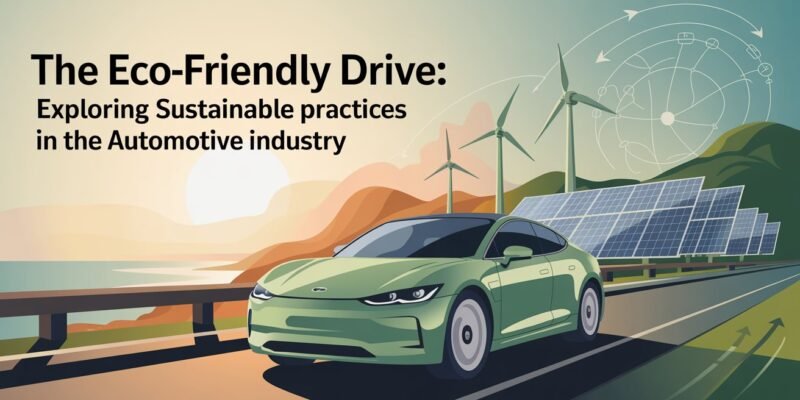In a world increasingly conscious of its environmental footprint, your interest in sustainable practices within the automotive industry marks a pivotal shift towards eco-friendly innovation. As a discerning reader, you understand the critical balance between technological advancement and ecological responsibility. Whether you’re looking for a car accident attorney Peoria, this article invites you to explore the transformative green initiatives redefining the production and operation of vehicles.
Understanding the Need for Sustainability in the Automotive Industry
Environmental Impact
The automotive industry has a significant environmental footprint, primarily due to greenhouse gas emissions and resource consumption. As vehicles contribute significantly to air pollution, sustainable practices are paramount. By adopting eco-friendly technologies, the industry can dramatically reduce carbon emissions and contribute to combating climate change, ultimately ensuring a healthier planet for future generations.
Economic Incentives
Embracing sustainability also opens up economic opportunities. With the global shift towards green technologies, automakers can capitalize on new markets for electric and hybrid vehicles. This transition aligns with consumer demands for eco-friendly options and offers potential cost reductions through increased energy efficiency and resource optimization.
Social Responsibility
Moreover, the automotive sector has a societal obligation to act responsibly. By fostering sustainability, manufacturers can enhance their brand reputation and maintain public trust. This commitment demonstrates a proactive role in safeguarding the environment and contributing to the well-being of communities worldwide.
Innovative Eco-Friendly Technologies in Modern Cars
Electrification and Hybrid Systems
Modern vehicles are increasingly adopting electrification, with electric and hybrid systems leading the way toward sustainability. Electric vehicles (EVs) rely solely on electric power, reducing dependency on fossil fuels and cutting tailpipe emissions to zero.
On the other hand, hybrid cars blend internal combustion engines with electric propulsion, providing a flexible and efficient alternative to traditional gasoline-powered vehicles. These systems significantly decrease fuel consumption while enhancing performance through regenerative braking and optimized energy management.
Advanced Materials and Aerodynamics
The automotive industry also utilizes advanced materials, such as lightweight composites and high-strength steel, to enhance fuel efficiency. These materials reduce vehicle weight, allowing cars to travel longer distances with less energy.
Furthermore, aerodynamic advancements play a crucial role in reducing drag, directly impacting energy consumption. Automakers design sleek, wind-tunnel-tested shapes that allow vehicles to glide effortlessly through the air, boosting overall performance and sustainability.
Renewable Energy Integration
Manufacturers are integrating renewable energy sources into their vehicle operations to reduce environmental impact further. Solar panels on car roofs and hoods harness sunlight to power auxiliary systems or contribute to battery charging. This not only enhances efficiency but also extends the vehicle’s range.
The Role of Electric Vehicles in Promoting Sustainability
Environmental Benefits of Electric Vehicles
Electric vehicles (EVs) play a crucial role in the pursuit of sustainable transportation. Eliminating tailpipe emissions significantly reduces urban air pollution, thus enhancing air quality and public health. EVs also support the reduction of greenhouse gases, which are critical contributors to climate change. This reduction aligns with global efforts to adhere to international climate agreements and targets.
Energy Efficiency and Renewable Integration
Electric vehicles boast superior energy efficiency compared to conventional internal combustion engines. Their ability to integrate with renewable energy sources, such as solar and wind, amplifies their environmental benefits. When charged using renewable electricity, EVs operate with a minimal carbon footprint, thus supporting a clean energy future.
Economic and Technological Advancements
The growth of the EV sector spurs economic progress and technological innovations. Investment in EV infrastructure and related industries creates jobs and fosters advancements in battery technology. This drives down costs and extends the range and performance of electric vehicles, making them a more viable and attractive option for consumers worldwide.
Sustainable Manufacturing Practices: Reducing the Industry’s Carbon Footprint
Green Innovations in Vehicle Production
The automotive sector has embraced various environmentally friendly manufacturing techniques to reduce its carbon footprint. Eco-friendly innovations include the use of recycled and renewable materials in vehicle components, which significantly reduces waste. Additionally, automakers prioritize energy efficiency by incorporating solar and wind power into their production facilities. This shift not only decreases greenhouse gas emissions but also lowers operating costs.
Advanced Technologies for Sustainable Manufacturing
Cutting-edge technologies, such as robotics and automation, streamline production processes, thereby reducing material usage and energy consumption. Innovations in 3D printing further minimize waste by enabling the precise manufacturing of parts. Moreover, companies employ advanced supply chain management to optimize logistics and reduce transportation emissions, showcasing a commitment to comprehensive sustainability.
Final Thoughts
As you navigate the evolving landscape of the automotive industry, embracing sustainable practices becomes not only an ethical decision but a strategic imperative. By prioritizing eco-friendly innovations, you contribute to a future where environmental stewardship and technological advancement go hand in hand. Whether you are looking for a car accident attorney in Peoria, your commitment to sustainability aligns with global efforts to combat climate change and positions you as a leader in a transformative era.
Do Read: Essential Evidence to Collect After a Pedestrian Accident: A Step-by-Step Legal Guide













